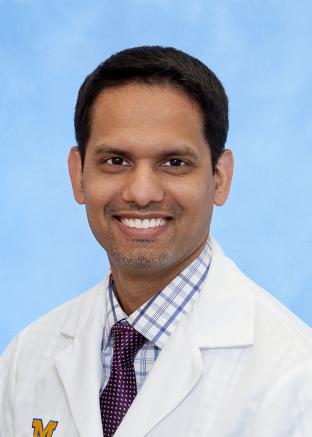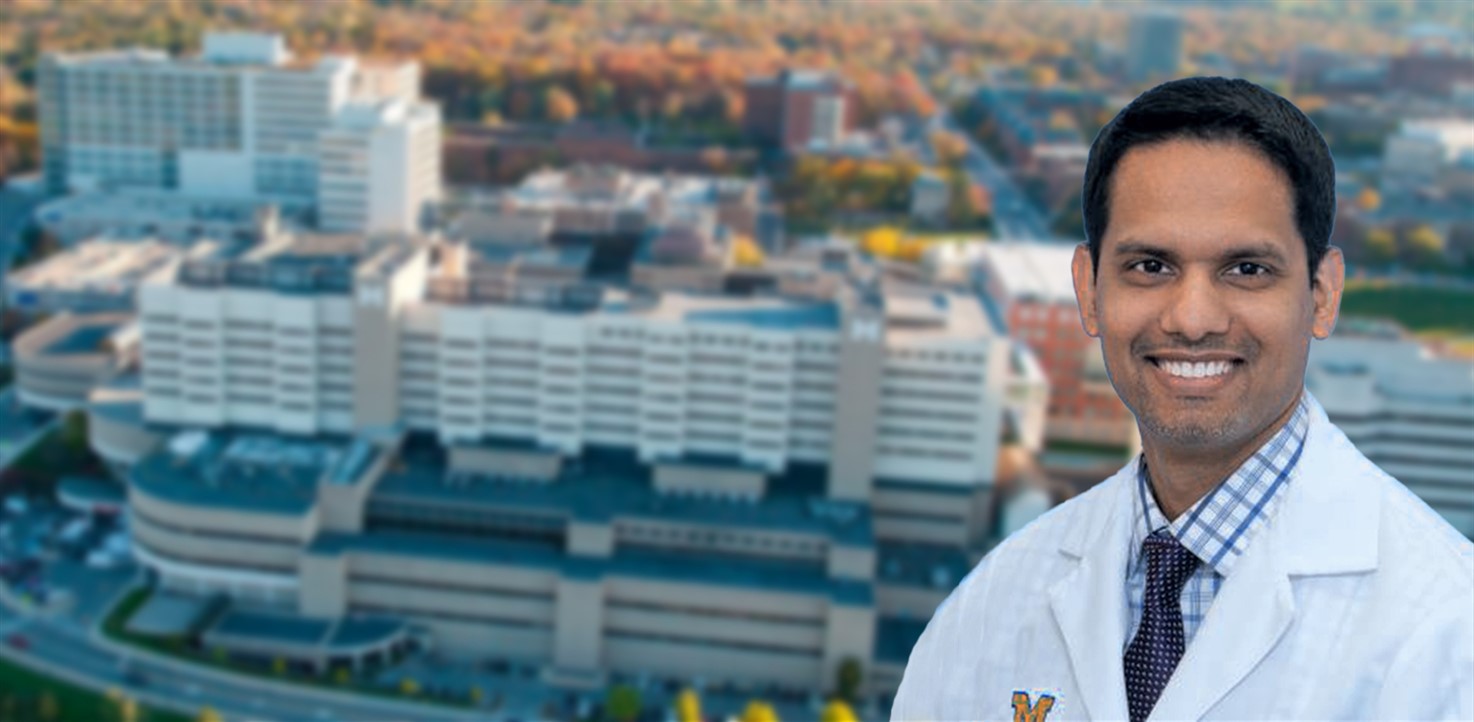 The University of Michigan Board of Regents today approved the appointments of Aditya S. Pandey, M.D., as chair of the Department of Neurosurgery and the Julian T. Hoff, M.D., Professor of Neurosurgery in the Medical School, effective June 1, 2022.
The University of Michigan Board of Regents today approved the appointments of Aditya S. Pandey, M.D., as chair of the Department of Neurosurgery and the Julian T. Hoff, M.D., Professor of Neurosurgery in the Medical School, effective June 1, 2022.
Pandey is a professor of neurosurgery, radiology, and otolaryngology-head and neck surgery in Medical School. He also serves as surgical director of the Comprehensive Stroke Center, director of strategic vision and outside collaborations in the Department of Neurosurgery, and director of the Endovascular Neurosurgery Fellowship.
After completing a Bachelor of Science in biological and engineering sciences at Washington University in St. Louis, he earned his medical degree from Case Western Reserve University. He then gained training in neurological surgery with sub-specialty training in microsurgical and endovascular treatment of cerebrovascular disorders at Thomas Jefferson University Hospital in Philadelphia.
Pandey joined the U-M faculty in 2008 as an assistant professor of neurosurgery, and became assistant professor of radiology and associate professor of otolaryngology in 2012 and 2017, respectively. He earned promotion to his current rank of professor of neurosurgery (with tenure), radiology and otolaryngology-head and neck surgery in 2020.
He specializes in treating individuals who have blood vessel related diseases of the brain and spinal cord (e.g., aneurysms, AVM, stroke, fistulas, cavernomas, bleeding within the brain, etc.) as well as leading innovations with ultrasound and catheter-based technology for the treatment of ischemic and hemorrhagic stroke patient populations. He has co-led the formation of cerebrovascular centers at University of Michigan Health-West in Grand Rapids as well as in northern Michigan. He led the formation of the Michigan Endovascular Research Group (MERG), which aims to improve stroke care in the state of Michigan.
Pandey’s research interests include development of ultrasound technology for incisionless treatment of neurosurgical patient populations, understanding the role of CSF toxins in the development of post hemorrhagic hydrocephalus, and understanding opportunities of improvement of clinical outcomes of stroke patients through collaboration and large database analysis.
His collaborative research efforts have culminated in numerous innovations, more than 200 peer-reviewed publications, and grant support from the National Institutes of Health, American Heart Association (AHA), American Hydrocephalus Association, Joint Institute, the Joe Niekro Aneurysm Foundation, and the Focused Ultrasound Foundation. He serves as an associate editor for the AHA journal Stroke-Vascular and Interventional Neurology and as an editorial review board member for Operative Neurosurgery.
Pandey succeeds Karin M. Muraszko, M.D., who has led the department for the past 17 years, making history as the first woman to chair an academic neurosurgery department in the country.
About University of Michigan School of Medicine:
“When the University of Michigan founded its medical school in 1850, it immediately assumed a leadership role in American academic medicine.
We were the first medical school in the United States to recognize the importance of, and to build, a university hospital for physician instruction. We were also a pioneer in the introduction of the modern science-based curriculum, and were among the first schools to change the role of the student from passive observer to active participant in the learning process through high-caliber laboratory instruction and clerkships.
We also enjoy a unique place in the annals of education as one of the very first major medical schools to admit female students and minorities. In the more than 165 years of service to students, these firsts, and many more, have galvanized our reputation as one of the nation’s premier public research-oriented medical schools.
The Medical School was the University’s first professional school, and since graduating its first class of six students in 1851 — a group that paid a mere $5 for two years of medical education — we have become a leader in preparing the physicians and scientists of the future.”
About Aditya S. Pandey, MD:
Aditya S. Pandey, M.D. achieved his Bachelors of Science in Biological and Engineering Sciences from the Washington University in St. Louis and Doctorate of Medicine from Case Western Reserve University School of Medicine. He then gained training in neurological surgery with sub-specialty training in microsurgical and endovascular treatment of cerebrovascular disorders under the guidance of Dr. Robert Rosenwasser at Thomas Jefferson University Hospital. Dr. Pandey specializes in treating individuals who have blood vessel related diseases of the brain and spinal cord (e.g., aneurysms, AVM, stroke, fistulas, cavernomas, bleeding within the brain, etc.) as well as practicing general neurosurgery (spinal disorders, brain tumors, and traumatic brain injury). Dr. Pandey is able to perform the latest techniques to treat stroke utilizing suction-stent thrombectomy techniques as well as treating the most complex of aneurysms utilizing flow diversion technology. He is one of two neurosurgeons in the Ann Arbor region who are trained to perform both open surgeries and endovascular procedures when treating patients with brain blood vessel related diseases.
His research interests include: development of ultrasound technology for incisionless treatment of neurosurgical patient populations, understanding the role of CSF toxins in the development of post hemorrhagic hydrocephalus, and understanding opportunities of improvement of clinical outcomes of stroke patients through collaboration and large database analysis. His collaborative research and innovation have culminated in numerous IP opportunities, more than 150 peer reviewed publications, and grant support from the NIH, American Heart Association, American Hydrocephalus Association, Joint Institute, the Joe Niekro Aneurysm Foundation, and the Focused Ultrasound Foundation.
- Dr. Pandey Co-leads efforts with Dr. Xu, from Biomedical Engineering, in developing ultrasound based histotripsy technology for incisionless treatment of patients with hemorrhagic stroke and brain tumors. This therapeutic intervention allows for the treatment of lesions in the brain without having to remove the skull or even make an incision. His efforts of advancing the histotripsy technology to the bedside is funded by the NIH.
- Dr. Pandey collaborates with Dr. Shih in the development of a smart drill which automatically stops once penetrating the inner cortex as well as the design of a microcatheter which can measure bioimpedance of intravascular clot and identify RBC rich vs. RBC poor clots. His collaboration with Dr. Pipe has led to the development of a hypothermia tool which is being designed to precisely and selectively cool the brain while maintaining normal core body temperatures. All of these devices have led to filing of provisional patent applications.
- Dr. Pandey in coordination with Drs. Xi and Keep are evaluating the role of peroxiredoxin-2 and carbonic anhydrase in the development of post hemorrhagic hydrocephalus towards a goal of medical management of hydrocephalus. Brain bleeding leads to fluid accumulation within the brain which then requires treatment with surgical intervention. To date, a medical therapy to treat or prevent hydrocephalus does not exist. Utilizing cerebrospinal fluid from brain bleed patients, he aims to identify the role of different toxins in hydrocephalus formation as well as the role of specific antidotes to those toxins in preventing hydrocephalus. Dr. Pandey has received the Innovator award through the American Hydrocephalus Association for the study of hydrocephalus.
- Dr. Pandey has worked with a multidisciplinary group at Michigan Medicine in evaluating large databases and reporting that volume outcome relationships exist in the management of ruptured aneurysms and that changes in stroke care are leading to lower mortality and improved clinical outcomes. He is currently working with colleagues to understand whether the development of stroke centers is leading to dilution of hemorrhagic stroke volume and associated changes in clinical outcome. He has also organized a volunteer group of cerebrovascular specialists across the state with the aim of data sharing and identification of opportunities of improving cerebrovascular care. These efforts are currently under consideration for a statewide clinical quality initiative.
- Dr. Pandey has participated in numerous clinical trials including being the lead PI for the SPAR trial (evaluating the role of seizure medication in aneurysm treatment) and the currently initiated DISH trial (evaluating the role of deferoxamine in the management of ruptured aneurysm patients). DISH trial will be the first trial to evaluate the role of iron chelation in management of SAH patients. This trial is funded through the Joint Institute and will also involve patients from Peking University.
- Dr. Pandey has led efforts to develop philanthropic support of hemorrhagic stroke research through the Brain Bleed Initiative (BBI). Funds available through the BBI will allow for completion of clinical translation projects with the aim of improving clinical care of all brain bleed patients.
Sources:
News: https://www.uofmhealth.org/news/archive/202206/michigan-medicine-names-new-chair-department-neurosurgery
School: https://medicine.umich.edu/medschool/about
Aditya S. Pandey, MD: https://medicine.umich.edu/dept/neurosurgery/aditya-s-pandey-md




